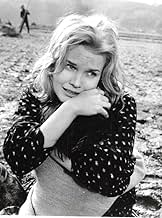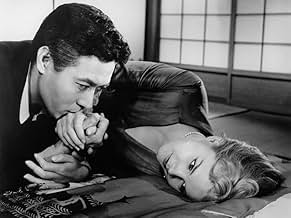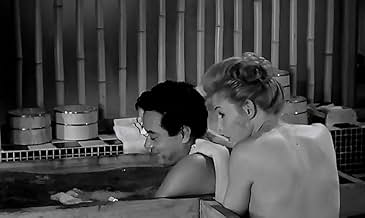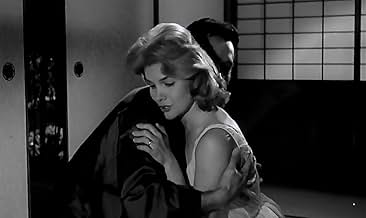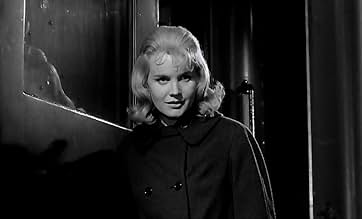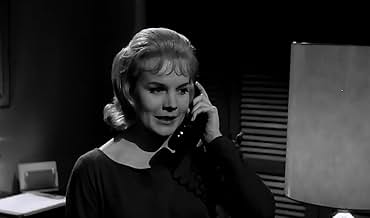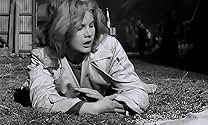Aggiungi una trama nella tua linguaBased on a true story, this compelling drama relates the difficulties of a young woman married to a Japanese diplomat during World War II, victim of suspicion and animosity from her husband'... Leggi tuttoBased on a true story, this compelling drama relates the difficulties of a young woman married to a Japanese diplomat during World War II, victim of suspicion and animosity from her husband's government.Based on a true story, this compelling drama relates the difficulties of a young woman married to a Japanese diplomat during World War II, victim of suspicion and animosity from her husband's government.
- Regia
- Sceneggiatura
- Star
- Premi
- 2 candidature totali
Recensioni in evidenza
The film is fascinating and well worth seeing. My only complaints are frequent ones for bio-pics made during the 1960s. Despite the film begin set from 1931-1945, the hair and fashions clearly are those of 1961. They didn't even try giving Baker a period hairdo or clothing and it just showed a lack of effort on the movie makers' part. Another problem, and a more minor one, is the stock footage used of an American plane strafing the Japanese countryside...clearly the type of plane changed three times due to sloppy editing. Still, beyond this, the film is interesting and worth seeing...and my complaints are more cosmetic than the story itself.
The movie can basically be divided into two halves. The first deals with Gwen and Terry's life in America. Meeting at a reception at the Japanese Embassy, they quickly fall in love. Gwen is from Tennessee; her family is none to happy at the prospect of her marrying a Japanese man, although to be honest the reaction seems to be a subdued one. More is made of the difficulty of Gwen being accepted by the Japanese - including her being summoned to the Embassy to meet the Ambassador, who asks her not to marry Terry. But they do marry, and Terry returns with her to Japan afterward. The culture chock for Gwen is more profound, as she suddenly has to deal with the subordinate place of women in the society, and with Terry's change in behaviour - as he seems desperate to fit back into Japanese society. After being re-posted to the Embassy in Washington, Terry is sent back to Japan with the outbreak of the war, and Gwen (and their new daughter Mariko) go with him, with both having to face suspicion and downright anti-Americanism as the war continues and as Japan is increasingly subjected to American bombing.
This struck me as a courageous film. Even to this day there aren't a lot of films that really try to give a Japanese perspective on the war and on the Japanese attitude to America and Americans during the war. In fact, the most interesting thing about this movie is that it's set in Japan during World War II and presents what comes across as an accurate portrayal of what life must have been like in that environment, especially for an American woman who would have been looked on with suspicion for that very reason. In fact, one mechanism that director Etienne Perier used well were the sideways glances of the Japanese people at Gwen - a mixture of curiosity and contempt. They were usually in the background and not that noticeable, but if you did notice them they made a powerful point. This was a good performance from Baker. She had been known mostly for glamorous, sexy roles to this point (and would continue mostly in that vein afterward) but she did a good job in this dramatic role. Shigeta (known mostly for guest starring roles on TV) was also very effective in his role. It was a very early role for him, and it represented a very serious role at a time when serious roles (without stereotypes) for Asian actors were relatively scarce. I thought Baker and Shigeta worked well together and were very convincing in portraying the Terasaki's love story.
It's a well made movie, combining politics, racism, war and a love story all in one. (8/10)
James Shigeta puts in an outstanding performance as Bakers Japanese husband who while in America acts very westernized. Once back in his homeland he acts much different and Shigetas job at this adds much to the film. The struggles of an interracial marriage are part of the story along with the horrors and hardships of being in a land that is becoming ravaged by total war being waged against it. In viewing this film you'll find yourself asking "How would I feel if I were in a foreign land with a wife or husband who was a native of that country and the nation of my birth was waging war on it". Who is the enemy? My spouses people or mine?
Mainly melodramatic treatment of a fact-based autobiographical novel, notable for its heartfelt leading performances, strikingly accurate detail of Japanese life, some convincingly documentary-style shots, and its brave change of perspective by showing the Japanese point of view against the American.
This was a true story about an American girl who came to Washington, DC, and there she met a Japanese diplomat. They fell in love and got married very quickly. Then WWII broke out, and all Japanese were deported back to their country. Gwen Teresaki went with her husband to Japan. It shows all the differences between the two cultures, and how Hidenari Terasaki became a teacher to his wife, Gwen, about the customs of the Japanese. It's truly a beautiful love story as well as a realistic account of the difficulties of this interracial marriage.
I really believe more should see this movie as it can open up your eyes as to the fact that all of us should live together in peace and get along. I will never forget this movie/life story! I wish the movie would come out again or be re-made as I believe it would help us all !
Lo sapevi?
- QuizThe memoir narrates the life of Gwen Harold (1906-1990), an American from Tennessee who in 1931 married Hidenari "Terry" Terasaki (b.1900), a Japanese diplomat. He was first secretary at the Japanese embassy in Washington, D.C., in 1941 when Pearl Harbor was bombed, was one of the staff who helped translate the Japanese declaration of war and delivered it (late) to the U.S. government and (as Gwendolen Terasaki wrote in her memoirs) earlier sent secret messages to Japanese pacifists seeking to avert war. The couple and their daughter Mariko were, like all Axis diplomats, interned in 1942 and repatriated via neutral Angola later that year. Terasaki held various posts in the Japanese foreign affairs department up to 1945 when he became an advisor to the emperor, and was the official liaison between the imperial palace and General Douglas MacArthur, the Supreme Allied Commander.
Mariko and her mother left Japan in 1949 so that Mariko could attend East Tennessee State University in Johnson City, Tennessee. Terry died in 1951 in Japan at the age of 50.
During the scene in which the Japanese ambassador tries to persuade Gwen to call off the marriage, he seems to hint at a possible conflict between the two countries. However, it is unlikely that he would have been aware of any definitive war aims in 1935, as Japan was still at peace with China. Soon after, Japan would declare war and, in protest against its actions, the United States would issue an oil embargo against Japan, escalating the disagreement between the two and paving the way for war.
The speech that Hirohito gives on the radio at the end of the film is a part of the actual recording of the speech that was played to announce plans of surrender. However, Terry's translation for Gwen is actually only bits and pieces of the much longer speech, but it sounds as though he is translating it word for word.
- BlooperAlthough the story is set in the 1930's and 1940's, the characters' clothing and hairstyles are those of the late 1950's/early 1960's.
- Citazioni
Gwen Terasaki: Well, go on say it: I was a shameless hussy and I disgraced your household. Well I am not going to crawl on my knees to you just because I made a little social error.
Hidenari Terasaki: Social error? Forgetting your place as wife of my household? Insulting a guest?
Gwen Terasaki: Who insulted whom, I'd like to know. What are you getting so worked up for anyhow? You didn't agree with him either.
Hidenari Terasaki: That is my privilege as a man, not yours. You were rude and humiliating. Acting thus may be permissible in the State of Tennessee...
Gwen Terasaki: Never mind the State of Tennessee, at least they treat women like human beings. Why the minute you stepped off the ship you started pushing me around like a 14th Century samurai.
Hidenari Terasaki: 16th Century.
Gwen Terasaki: Okay. Well this is the twentieth. I don't mind going in the doors behind you. I don't even mind bowing to your friends and relatives but when a girl can't even open her mouth without starting a scandal...
Hidenari Terasaki: Then keep mouth shut! According to custom.
Gwen Terasaki: Your customs. Not mine. And you can put them back in the Middle Ages where they belong. Furthermore I am sick of smiling and scraping and bowing even when you'd like to murder somebody. I'm sick of all the set of complicated rules that put honour and duty before simple human truth. I'm sick of a place where people can't show their real emotions; where women are treated like pieces of furniture and it's a quaint old custom for fathers to sell their baby daughters.
Hidenari Terasaki: Stop weeping!
Gwen Terasaki: I'll weep if a I want to.
Hidenari Terasaki: Trick of American women to obtain pity. Stop it!
Gwen Terasaki: I know what they call me at the Foreign Office; "Terasaki's Falling". Well Aunt Peggy was right and so was your ambassador. I only wish I'd listened to them
- Curiosità sui crediti[prologue] This film is based on actual events in the life of Gwen Terasaki, as told in her autobiography.
- ConnessioniEdited from Missione segreta (1944)
I più visti
- How long is Bridge to the Sun?Powered by Alexa
Dettagli
- Tempo di esecuzione1 ora 53 minuti
- Colore
- Proporzioni
- 1.66 : 1
Contribuisci a questa pagina




